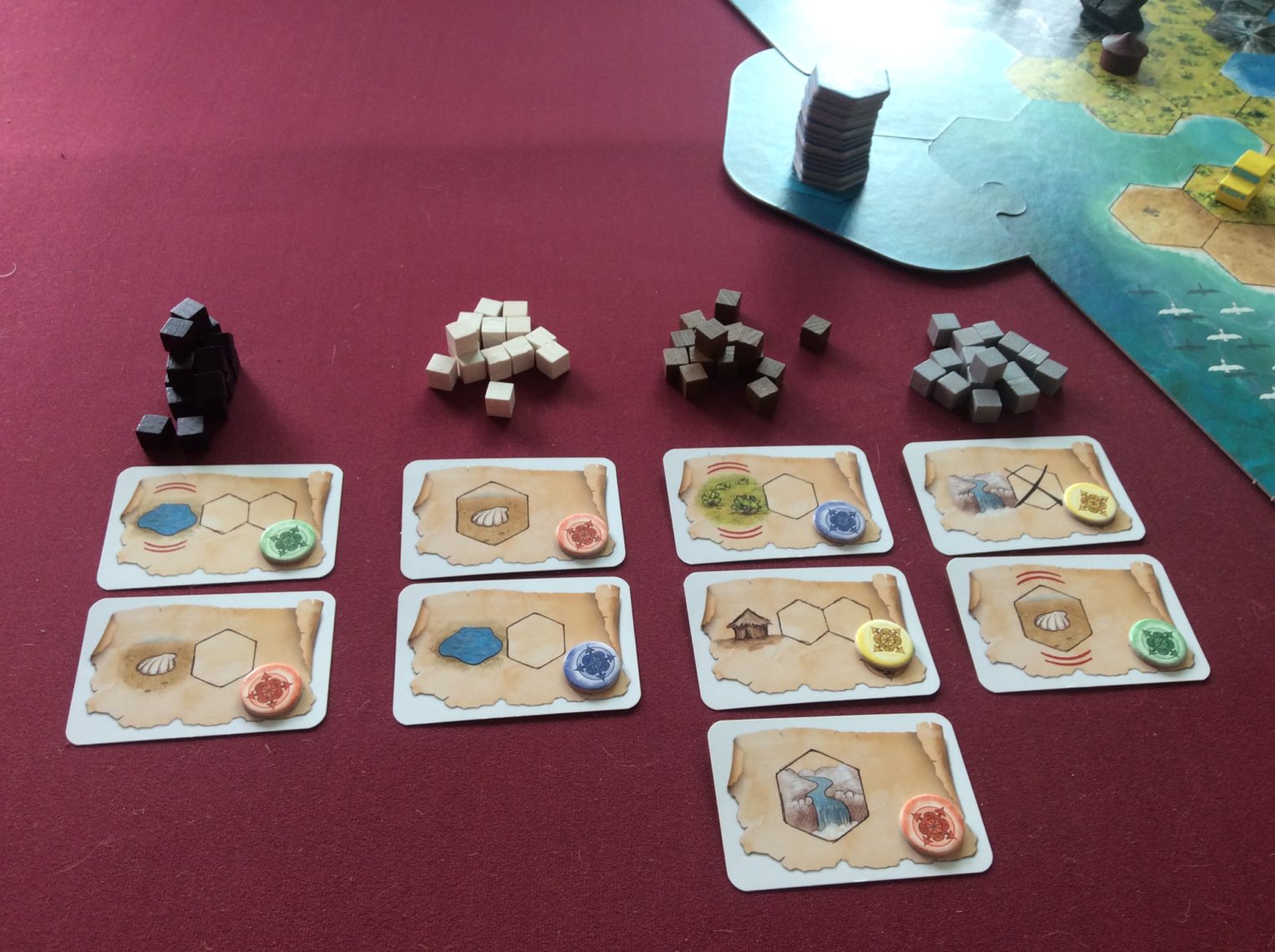Back in 2009, Bruce Allen published his one and only game with Zoch Verlag, a tropical island treasure hunt game called Tobago. As usual, Zoch did a beautiful job with the production values, including wooden huts, palm trees, and adorable Moai heads. The individual player pieces are called ATVs in the rules, but they are clearly jeeps, which I, and now you, will call jeeples.

Players are treasure-hunters looking to find buried gold on a jungle-covered island. Individual treasure sites are found through creating maps by playing clue cards. Each clue card added to a map will reduce the possible number of places on the island that can hold that given treasure. There can be up to four active maps at any time. The island is divided into areas of six different terrain types (beaches, lakes, rivers, jungles, mountains, and scrub brush). Clue cards will indicate things like “must be in a lake,” “cannot be on a mountain,” or “will be on the largest beach.” There are also landmarks (the trees, huts, and Moai) that will be in different places every time you play. Clue cards can say “next to” or “in sight of” one of these landmark types. When a player adds a card to a map, two things must be true about the clue: firstly, it cannot contradict a previous clue for that map, and secondly, it must reduce the number of possible spaces to find the treasure. For example, if the first card in a map says “must be in a lake,” the next card can’t say “must be in a jungle,” but the second also couldn’t say “can’t be in a jungle.” The first example contradicts, so it’s invalid, and the second example doesn’t give any new information (if the treasure must be in a lake, then obviously it can’t be in another terrain type).

Each time a player adds a clue to a map, they mark the clue with one of their coloured tokens. This is done so the people who worked hard on the map get more chances to get gold from the eventual find. Once the treasure site has be determined, the first player to drive their jeeple onto the spot can choose to dig it up, and doing so allows them to place a token on the map, so even if they never played a single clue card, if they beat everyone else to the dig site, they get first crack at the gold.
Gold comes in the form of cards, ranging in value from 2-6 gold coins. The number of cards found at a dig site is equal to the number of cards in the map plus one. Gold cards are distributed in Last In, First Out order. Each player is secretly shown one card for each token they have played on that dig site (that’s one per clue card they played, plus one for the player who digs it up), then the cards are shuffled and the first one is revealed and offered to the digger, who can take it, and remove their token from the site, or pass on it, letting the next player with a token at the site choose to keep it or pass. Once the first card is claimed (or discarded, if all players pass on it), the next card is revealed and offered to the first player in the pecking order. A player would pass on a gold card if they know there is a higher value one somewhere in the dig.

In the treasure pile, there are two cursed gold cards (they have a skull & crossbones instead of coins). If a curse card is revealed, the first player in the pecking order has been cursed and loses the highest value gold card in their entire stash (not just from what they’ve taken from this dig). No more gold from this site is revealed, so anyone with remaining tokens in the queue gets nothing. If you saw a curse card in the sneak preview, you may want to take a low value card and get out of the dig, lest you risk running afoul of the curse.
Every time a treasure site is dug up, the mysterious moai on the island summon magical amulets to surface from the ocean, and wash up on the shores of the island. Anyone who drives their jeeple over an amulet, can pick it up. Amulets can be spent to let you take an extra action on your turn (drive your jeeple, play a clue card, swap your hand of clues for fresh ones, etc), but most importantly, amulets protect you from the cursed gold. If you find a curse, you can give up an amulet instead of your best gold card.

Tobago is part race, part logic puzzle, part push your luck, and part co-op (the map building is cooperative, but in the end it is every digger for themselves). Whether you’re a new gamer looking for something different from the games you’re used to playing, or an experienced gamer looking for a light game with just enough tense decisions to scratch the tactical itch, you can’t go wrong with Tobago.
The game is good for 2-4 players, and with three reversible board segments, and a handful of landmark pieces, the board set up will never be exactly the same twice, so it’s impossible to “learn the board” and have wrote opening moves. As far as Zoch Verlag’s catalogue of games goes, this is on the higher end of complexity, but considering that Zoch specializes in dexterity games, and family-friendly strategy, Tobago makes a good gateway for novice gamers. If you’re an enthusiast who frequently introduces new people to this fabulous hobby, and you’re getting sick of using Ticket to Ride, Carcassonne, and Catan as your go-tos, you should definitely add Tobago to your repertoire.
Jeeples!